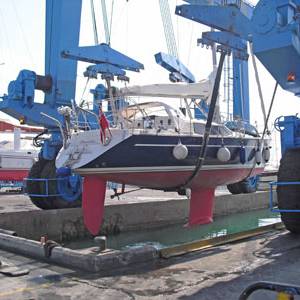
Commonsense Boat Buying
Buying a yacht is generally a big financial commitment for most people. Ensuring that you sell or buy successfully requires a little effort on your part.
Let’s start with the physical yacht itself. There are four really important things that you need to ensure as part of a purchase or sale:
1) Integrity of the hull and deck.
2) The state of the engine(s).
3) The state of the rigging.
4) The state of the sails.
Many buyers abdicate responsibility for these four key points and engage a surveyor to give them a condition report. If you really want to extract value from a survey then the surveyor needs to be directed and that means doing a thorough initial inspection yourself before handing over to a professional surveyor.
The hull is what keeps the boat afloat! There seems to be an almost obsessive concern about osmosis on the part of many buyers when a much more likely cause of sinking are inadequately maintained sea cocks. How many buyers lift up the cabin sole and check that all the sea cocks operate correctly and that the hoses are not perished? Too few in my opinion! Ask the vendor to tell you when was the last time the boat was out of the water, what hull maintenance was carried out in the last two years, why? Ask the vendor to tell you if the yacht has ever been grounded or involved in an accident.
You do not need to go out on a sea trial to know that an engine is sound. Run it, look at it, listen to it, look at the exhaust fumes put it into gear against secure berthing lines and let it run up to operating temperature. Ask impertinent questions about the maintenance regime.
Look at the rigging is there any sign of corrosion or cracking? Are the chain plates securely anchored? When was the standing rigging last renewed?
In the case of the sails make sure you know what’s in the sail wardrobe. Examine the fabric. Is the stitching sound? UV radiation damages sail fabric especially the stitching, use your own eyes.
I do not value a boat by the marine electronics installed aboard. This can be changed relatively easily. The inexorable price/performance improvement of marine electronics in recent years and the ability of yachtsmen to buy their kit in tax free locations like Gibraltar lower its importance in any buying decision.
Finally examine the safety gear and make a list of what is in date and what needs to be replaced.
Do all of this BEFORE making an offer and before you engage in survey costs.
So what do you need a surveyor for? A surveyor needs to be directed to find genuine “material defects”. A surveyor’s report padded out with photographs, telling you what model winches are installed or stating the obvious copied from the broker’s yacht listing is as useful as a chocolate watch! If you’ve inspected the boat yourself you’ll know all about the safety equipment and all the other kit installed on the vessel. You don’t need a surveyor to tell you there are four out of date fire extinguishers on the boat! A good surveyor will be pleased to receive guidance to delve more deeply in those areas where your own inspection raised concerns. This makes his life more interesting and gets you immersed in what will soon become your own boat. If your chosen surveyor insists on doing things that would not add further insight beyond what your own inspection has revealed say so and if he insists remember you are the customer and you have choices.
Then there is documentation to consider. A good broker will ensure that there is clear title to the vessel. If the vessel has been sold within the previous five years you will want the vendor to produce the previous Bill of Sale because the yacht registry will require it. What is the VAT status of the vessel? Can the vendor produce documentary evidence of payment of VAT? Does the vessel meet the EU RCD (Recreational Craft Directive)? Look for a CE certificate or a plaque stating CE compliance somewhere in the cockpit.
If you find this daunting you shouldn’t, it’s all commonsense. Boatshed Gibraltar is there to help guide you through the whole transaction and beyond making sure not only that you acquire a sound yacht but that you have a berth, insurance and a professional skipper (if you need one) to introduce you to handling your new vessel.
Find us at www.boatshedgibraltar.com


